About WENDI
WHAT is UNESCO Chair?
The UNITWIN/UNESCO Chairs Programme was established in 1992 to promote inter-university cooperation and networking to enhance institutional capacities through knowledge sharing and collaborative work. UNESCO Chairs are basically located in a university as a chair system where professors and students are learning together to co-produce new ideas and methods for sustainable development. They will play roles of think tanks with human resources as well as tangible resources.
1.1 Policies of UNESCO Chair WENDI
The objective of the UNESCO Chair on Water, Energy and Disaster Management for Sustainable Development, Kyoto University (WENDI) is to equip students with knowledge, superior skills and broad perspectives to address the many challenges that today’s societies face. WENDI thus offers a novel and interdisciplinary Higher Education and Research for Sustainable Development (HESD) Programme, a solid certificate programme, and also encourages and values students’ self-learning. WENDI aims at contributing to achieving the SDGs as well as establishing resilient societies through collaborative education and research with established researchers and experts from the United Nations, international organisations, other UNESCO Chairs and Centres, governmental organisations, universities, research institutions and private enterprises. (General Policy)
- Any graduate student belonging to Kyoto University (KU) who has strong interests in carrying out one’s activities along interdisciplinary and international frameworks is welcome to register for the WENDI’s educational programme. A part of WENDI’s activities is open to under-graduate students. (Admission Policy)
- The WENDI’s HESD Programme (WENDI-HESD) requires registered students to acquire interdisciplinary perspectives and practical skills by identifying problems, understanding on-going global challenges and exploring implementable solutions. Registered students must fulfil credit requirements, including field training, and demonstrate fundamental academic knowledge of water, energy and disaster management in addition to their own expertise in order to complete each of the WENDI courses. (Curriculum Policy)
- Making the best use of UNESCO’s field sites (Geoparks, Biosphere Reserves, World Cultural Heritages and World Natural Heritage Sites) as well as KU’s field sites and overseas stations, the WENDI will promote international collaborative research to contribute to achieving the SDGs and building resilient societies. Registered students shall gain creative perspectives and research competency through collaboration with researchers in and out of KU. (Research Policy)
- The WENDI will develop a short-term UNESCO-Chair training programme for registered students as well as students and practitioners from developing countries. The WENDI-HESD will recruit participants and promote information sharing on outcome of the educational and research endeavours through UNESCO’s networks. (International Contribution Policy)
1.1 ユネスコチェアWENDIのポリシー
水・エネルギー・災害研究に関するユネスコチェア(京都大学ユネスコチェアWENDI)の目的は、現代社会が直面する様々な課題の解決に取り組む知識・技術・広い視野を備えた人材を育成することである。このため、学生の自主的な学びを尊重しつつ、学問分野の垣根を越えた新たな学際的な高等教育における持続可能開発教育・研究(HESD)の質が保証されたプログラム(以下WENDI-HESDプログラムとする)を提供する。国連・国際機関、他のユネスコチェアあるいはユネスコセンター、政府機関、大学・研究機関及び民間組織の卓越した研究者・教員と協働することにより、SDGsの達成及びレジリエントな社会の構築に貢献する。【基本方針】
- 学際的及び国際的な枠組みで活動することに強い関心を持つ京都大学の大学院生を登録生として迎える。また一部の科目については、学部生の参加を認める。【アドミッションポリシー】
- WENDI-HESDプログラム登録生には、問題の所在の認知、世界的な取組み状況の把握、解決に向けた方策の模索を通じて、学際的な視野と実践力を身に付けることが求められる。各コースの所定の科目(フィールド実習を含む)登録を完了し、専門分野に加えて水・エネルギー・災害に関する基盤的な学識を身に付けていることが、修了の基準となる。【カリキュラムポリシー】
- 京都大学ユネスコチェアWENDIは、ユネスコのフィールドサイト(ジオパーク、エコパーク(生物圏保存地域)、世界文化遺産、世界自然遺産)及び京都大学のフィールドサイト・海外拠点等を活用することにより、SDGsの達成及びレジリエントな社会の構築に貢献する国際協働研究を展開する。学生は、国内外の研究者との協働を通じて俯瞰的な発想力及び研究能力を身に付ける。【リサーチポリシー】
- 京都大学ユネスコチェアWENDIは、途上国の学生や実務者及び登録生を対象とした短期研修プログラムを開発する。ユネスコのネットワークを活用し、登録者を募集するとともに、WENDI-HESDプログラムの教育・研究活動に関する成果の情報発信・情報共有を推進する。【国際貢献ポリシー】
1.2 Outline of UNESCO Chair WENDI
The UNESCO Chair WENDI aims to promote multi-disciplinary and holistic approach for research implementation, knowledge transfer and capacity building in the fields of water, energy and disaster management, and linkages to other sectors (bioresources and ecosystems, river basins from mountain to ocean, resilient societies, climate change and data science) in Kyoto University (KU) and partner organizations all over the world. This is done by developing a comprehensive and trans-disciplinary Higher Education for Sustainable Development (HESD) programme to establish a ‘KU-Model of HESD’ and by providing unique international collaborative research using existing UNESCO-Sites including Geoparks, Biosphere Reserves and Cultural, Natural and Mixed World Heritage Sites and domestic and overseas research sites of Kyoto University as the application fields.
To achieve this aim, WENDI will organize education and training programme targeting students and practitioners mainly from developing countries, formulate related education and training materials and continue to contribute to the activities in the International Hydrological Programme (IHP), especially ones of the UNESCO IHP Regional Steering Committee (RSC) for Asia and the Pacific region, as well as UNESCO’s Man and the Biosphere Programme (MAB) and the International Geoscience and Geoparks Programme (IGGP). It will also contribute to advanced and trans-disciplinary studies and scientific research projects in the fields mentioned above. The WENDI will also align with IHP’s international initiatives such as the promotion of water-related studies in collaboration with FRIEND, IFI, IDI, and IIWQ by developing new theories and technologies for monitoring, assessing, predicting and managing global risks in the world including climate change. Furthermore, the WENDI will contribute to the field of data science which is inseparable from the practical implementations of the above activities.
Overall, the Kyoto University UNESCO Chair WENDI will emphasise on the involvement of policy makers and practitioners to foster science- and technology-based decision-makings to build a sustainable, resilient and survivable society.
| Notes: | FRIEND = Flow Regimes from International Experimental and Network Data |
|---|---|
| IFI = International Flood Initiative | |
| IDI = International Drought Initiative | |
| IIWQ = International Initiative on Water Quality |
1.2 ユネスコチェアWENDIの概要
ユネスコチェアWENDIは、水・エネルギー・災害管理に関する分野において、さらには、そのほかの関連分野(生物資源・生態系、森里海を含む河川流域、レジリエントな社会、気候変動、データ科学)において京都大学内及び世界中のパートナー機関とも連携をとりながら、研究実施、知識移転、能力育成のために多分野にまたがる包括的なアプローチを推進することを目指す。そのため、総合的で超学際的な高等教育レベルでの持続可能開発教育(HESD)を実践し「HESD京大モデル」を確立するとともに、ジオパーク、エコパーク(生物圏保存地域)、世界文化・自然遺産と京都大学が有する国内外の研究拠点を教育研究の現場として活用したユニークな国際共同研究を実施する。
こうした狙いを達成するために、WENDIは、京都大学の学生や途上国からの実務家を対象とした教育・研修プログラムを組織し、関連する教育研修教材を整え、国際水文学計画(IHP)、特にアジア太平洋地域のユネスコIHP地域運営委員会の活動、さらには、ユネスコ人間と生物圏計画(MAB)、国際地質科学ジオパーク計画(IGGP)の活動への貢献も継続する。また、上記各分野の先進的かつ超学際的な研究及び科学研究プロジェクトにも貢献する。WENDIはまたFRIEND、IFI、IDI及びIIWQと協働で水関連研究の推進といったIHPの国際的なイニシアティブとも連携して、気候変動を含む世界のグローバルリスクをモニタリング、評価、予測、管理する新しい理論や技術の開発を推進する。さらに、WENDIは、上述したような活動に不可欠なデータ科学の分野にも貢献していく。
すなわち、京都大学ユネスコチェア WENDIは、将来にわたって持続的でレジリエントで生存可能な社会の構築を目指し、科学・技術の確固たる基盤を持った意思決定を促進していくために、政策立案者や実務家にも参画を得て進めていくことの重要性を強く認識し実践していきたいと考えている。
| 備考: | FRIEND = 国際試験地ネットワークデータによる河川流況研究計画 |
|---|---|
| IFI = 国際洪水イニシアティブ | |
| IDI = 国際渇水イニシアティブ | |
| IIWQ = 国際水質イニシアティブ |
Structures
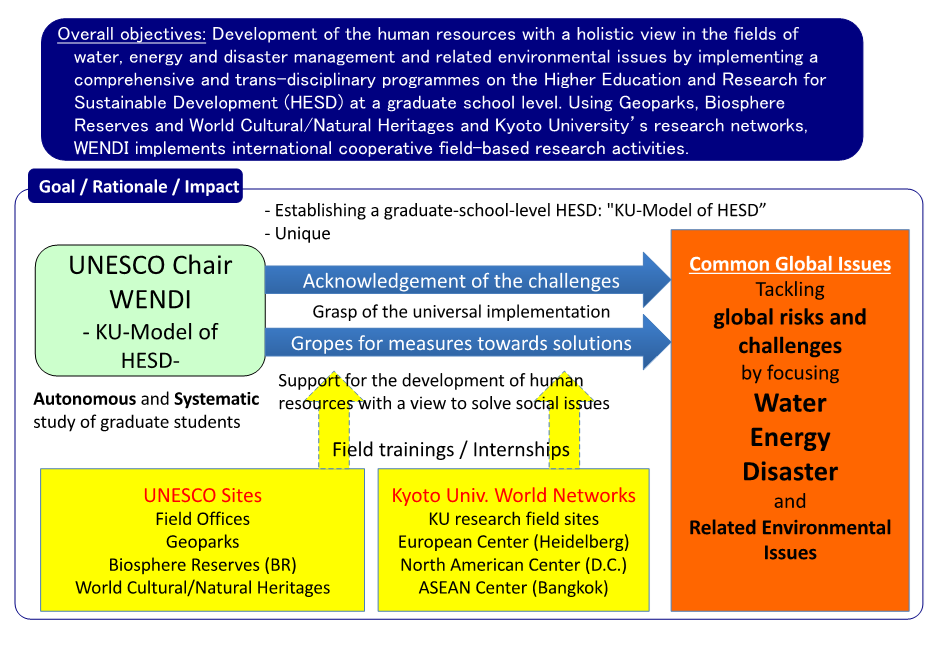
Fig. 1 Objectives, goal, rationale and impact of this project
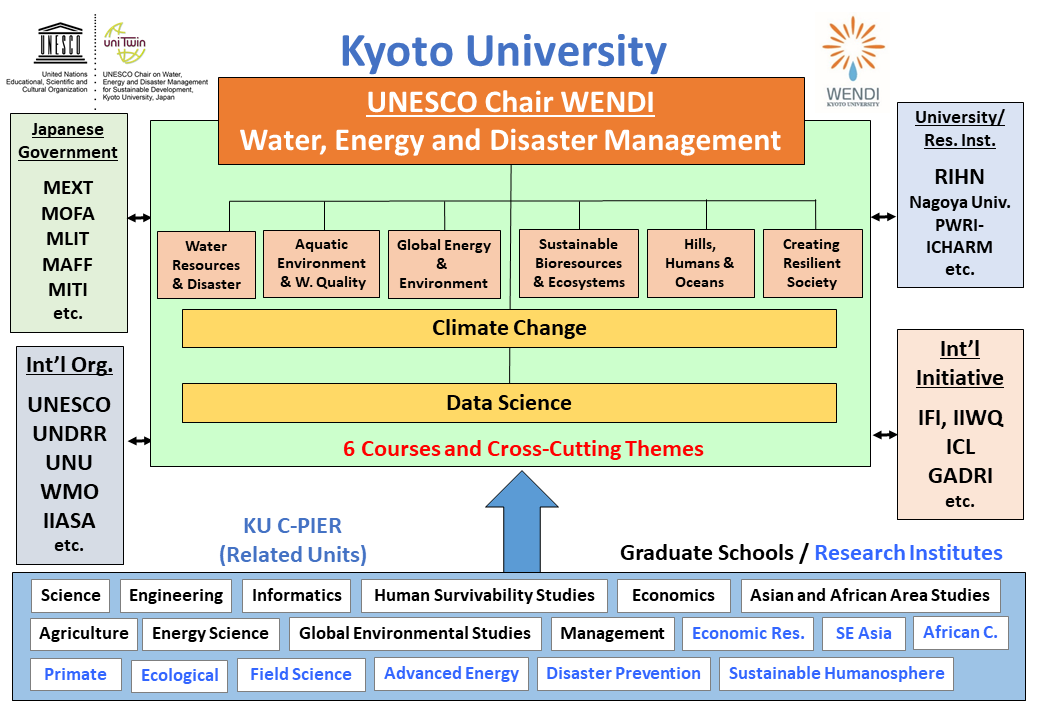
Fig. 2 Implementation structure of the project
実施体制
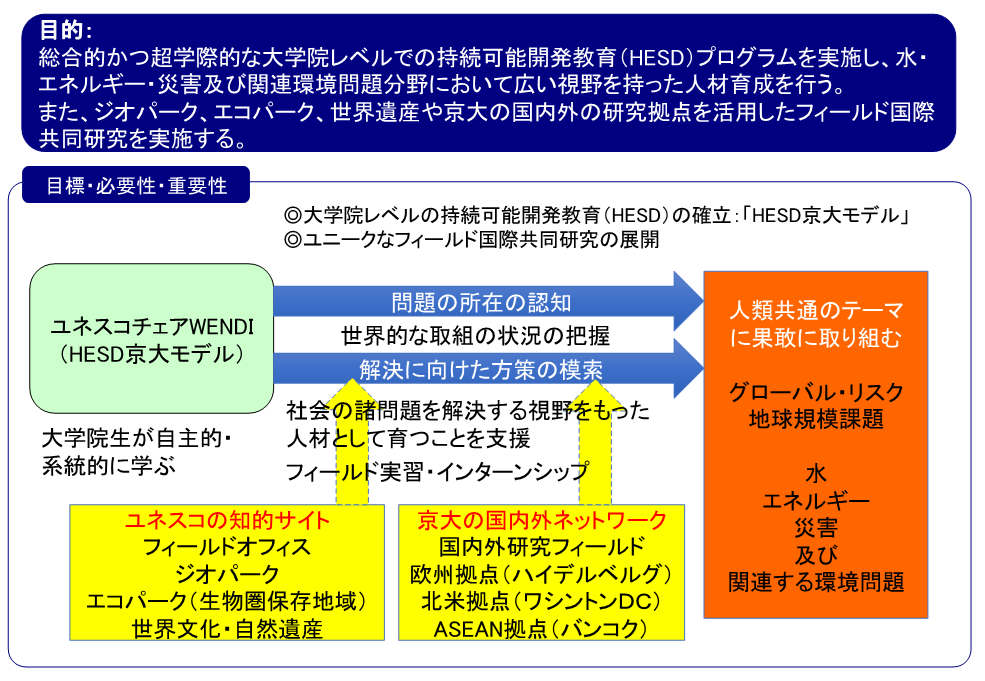
Fig. 1 目的と目標・必要性・重要性
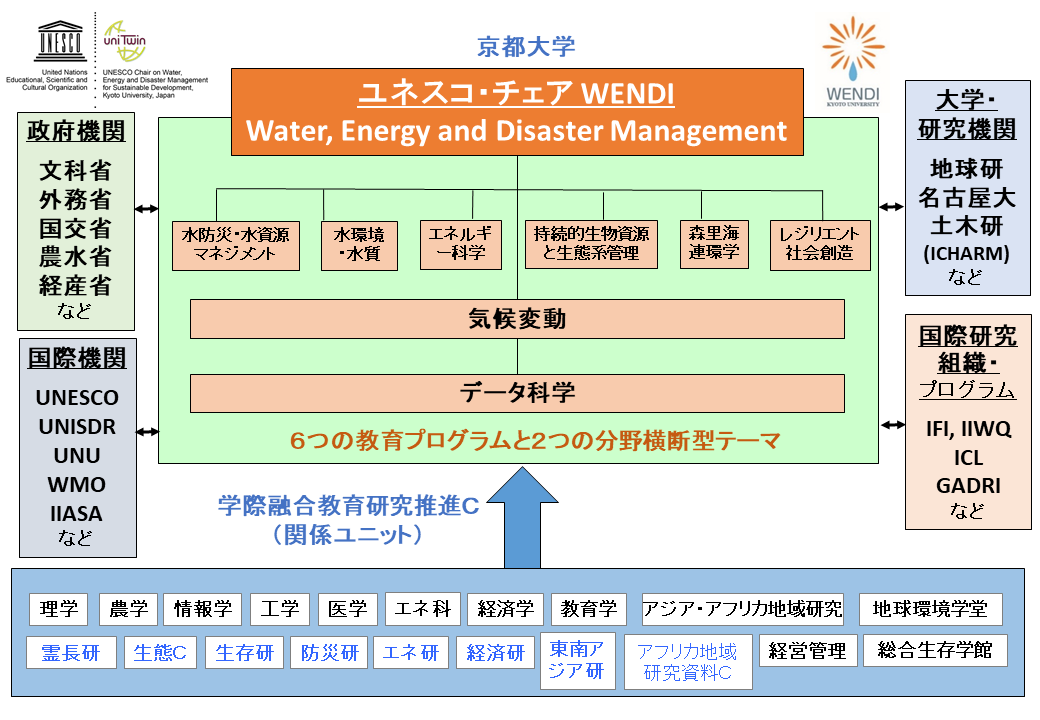
Fig. 2 実施体制
Contribution to SDGs
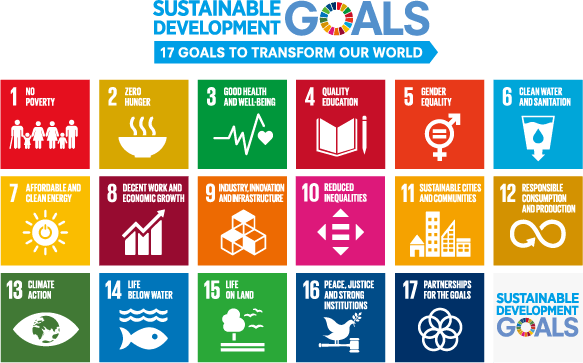
Among 17 Sustainable Development Goals (SDGs) of the 2030 Agenda for Sustainable Development, this project will focus on achieving Goal 6 (Clean Water and Sanitation), Goal 7 (Affordable and Clean Energy), Goal 11 (Sustainable Cities and Communities) and associated Goal 2 (Zero Hunger), Goal 13 (Climate Action) and Goal 15 (Life on Land) while it may also contribute to the achievement of the other goals. Included targets are 6.a (By 2030, expand international cooperation and capacity-building support to developing countries in water- and sanitation-related activities and programmes, including water harvesting, desalination, water efficiency, wastewater treatment, recycling and reuse technologies), 7b(By 2030, expand infrastructure and upgrade technology for supplying modern and sustainable energy services for all in developing countries, in particular least developed countries, small island developing States and landlocked developing countries, in accordance with their respective programmes of support), 11.b (By 2020, substantially increase the number of cities and human settlements adopting and implementing integrated policies and plans towards inclusion, resource efficiency, mitigation and adaptation to climate change, resilience to disasters, and develop and implement, in line with the Sendai Framework for Disaster Risk Reduction 2015–2030, holistic disaster risk management at all levels), 2.4 (By 2030, ensure sustainable food production systems and implement resilient agricultural practices that increase productivity and production, that help maintain ecosystems, that strengthen capacity for adaptation to climate change, extreme weather, drought, flooding and other disasters and that progressively improve land and soil quality), 13.1 (By 2030, ensure sustainable food production systems and implement resilient agricultural practices that increase productivity and production, that help maintain ecosystems, that strengthen capacity for adaptation to climate change, extreme weather, drought, flooding and other disasters and that progressively improve land and soil quality), 13.2 (Integrate climate change measures into national policies, strategies and planning), 13.3 (Improve education, awareness-raising and human and institutional capacity on climate change mitigation, adaptation, impact reduction and early warning), 15.1 (By 2020, ensure the conservation, restoration and sustainable use of terrestrial and inland freshwater ecosystems and their services, in particular forests, wetlands, mountains and drylands, in line with obligations under international agreements), 15.2 (By 2020, promote the implementation of sustainable management of all types of forests, halt deforestation, restore degraded forests and substantially increase afforestation and reforestation globally), 15.3 (By 2030, combat desertification, restore degraded land and soil, including land affected by desertification, drought and floods, and strive to achieve a land degradation-neutral world).
